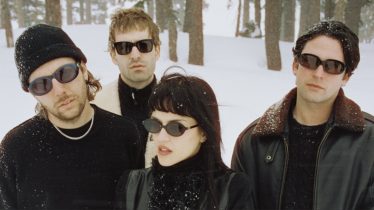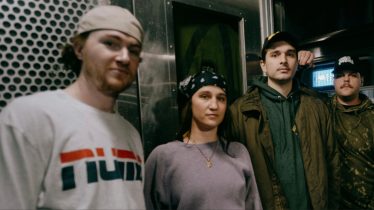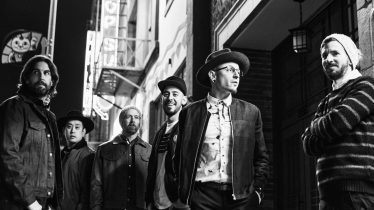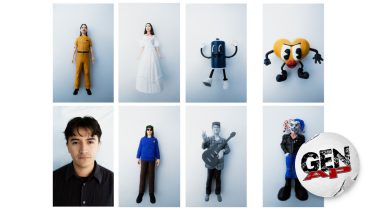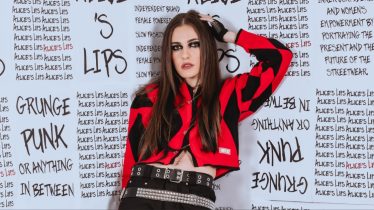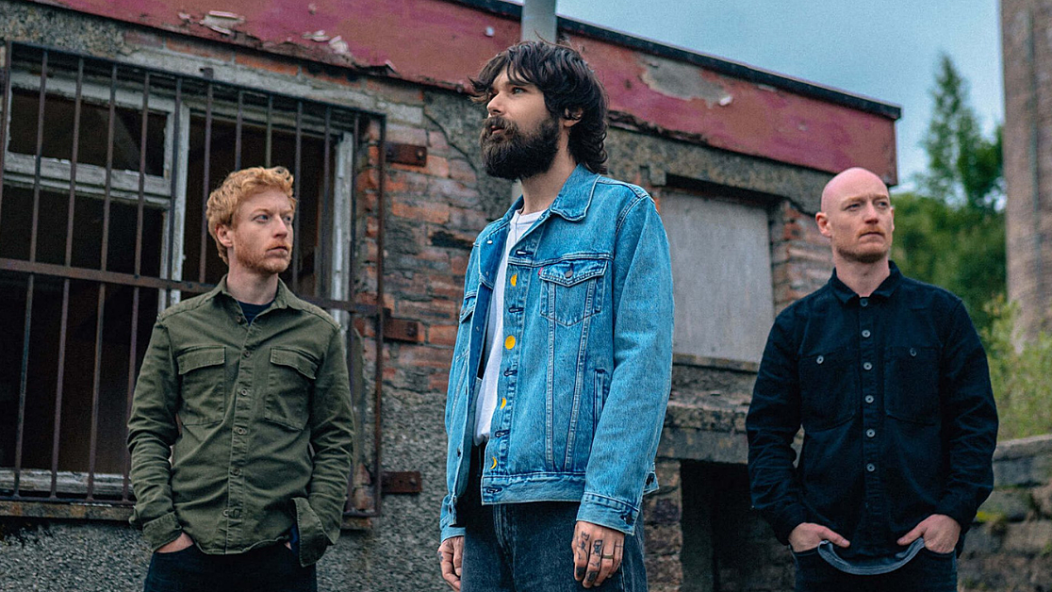
Biffy Clyro: “We want to put on a show that can change someone’s life”
Simon Neil is giddy with excitement, and who can blame him? For 20 years, the frontman of Biffy Clyro — arguably Britain’s biggest, and indisputably its finest, rock band today — has lived a life on tour; something that, for so many, was robbed of him by the past years’ COVID-19 crisis. This week, however, he and his band — twin brothers James and Ben Johnston — will finally get to return to their natural habitat and hit the open road once more when they embark on their first tour of the United States in five years, and their first tour proper of any description for nearly three.
Not that Biffy Clyro have been resting on their laurels in that downtime. Hence why Neil, speaking to Alternative Press from his home in Scotland ahead of boarding a flight nine hours west to Chicago, is currently wrestling with trying to make not one, but two albums’ worth of new material released in the past 24 months fit into a single setlist. 2020’s A Celebration Of Endings marked the band’s third U.K. No. 1 record; 2021’s The Myth Of The Happily Ever After, meanwhile, was the subject of the recent Amazon Prime documentary Cultural Sons Of Scotland. Save for a handful of sporadic shows back home in the U.K., the upcoming tour will mark the first time the songs that comprise them will have been performed in earnest.
Read more: 10 alternative albums that are way better than you think
Settling down with AP, Neil discusses the importance of that fact, the magic of returning to venues where you can see the whites in the eyes of your audience and his love affair with America’s musical greats…
The past couple of years have been pockmarked with live shows here and there between COVID lockdown restrictions being eased and tightened, but this will mark your first real tour in three years or so. For a band like Biffy Clyro, how important is it to get back out on tour?
A band like us, we live on the road; it’s such an essential part of our progression and our evolution as a band. It’s been fucking weird to not have that on the menu. The relief and the excitement levels about coming to the States to play some shows is through the roof. We’re just grateful that we can tour. There’s a simplicity to touring the States for us; we play smaller venues, [and] we’re all on the bus together. It’s kind of old-school touring for us, and that’s what we need, to get back to being a gang going town to town.
There’s something very beautiful about that. It’s primarily about being together with each other onstage, sharing music with fans in the room; I can’t begin to tell you how much we’ve missed that. If you’re not making music with your buddies, what the fuck are you doing? That’s how I feel.
Away from those moments spent onstage, there must be an excitement about getting to reengage with the simple pleasures of traveling the world — do you think the experiences of the past few years have made you reconnect with some of those joys that maybe, over many years of touring, lose their appeal and become “part of the job”?
It’s impossible to tour for 15 or 20 years and not slowly get into that habitual mode where you just get into a rhythm. Every moment of this tour is going to matter; from the moment we step on the plane to fly to the States, those moments that used to wind you up and that we’ve always described as the “unnecessary parts” — spending 23 hours a day waiting for an hour onstage — that doesn’t fucking apply this time. The most exciting thing is to be traveling together, to getting back to that essence of what a band truly is: a group of friends getting out and seeing the world, and trying to convert people to our music town by town. The simplicity of that has been missing.
If you’ve done maybe 100 gigs in one year, it’s hard for the 101st to not just be “another gig,” and it just feels so valuable and essential now. We felt lucky last year, as there was a small window in the U.K. where we were able to get out and play for a week, but it was such a tease. I feel everyone has simplified their approach to life; when I play a show, I just want to feel amazing and make other people feel amazing, but I’m not going to beat myself up now if I play a wrong chord or my voice is a bit tired. None of that matters anymore. It’s just about that transference of energy and sharing in something. It’s life-affirming. I feel that music has found its purity again; that connection between bands and fans has become deeper.
Touring the United States must still be a very different experience for you to touring in the U.K. Back home, you are an established arena- and festival-headlining act, where you play to tens of thousands of people. Returning to the U.S. sees you play more modestly sized theaters, the sort of which you haven’t toured in the U.K. for over a decade now. How do you adjust to returning to spaces of that size? Does it differ for you as an artist onstage and how you connect with the people in front of you?
The size of these rooms we’re playing in the U.S., that’s where we feel most comfortable. A lot of the shows I saw that changed my life were in rooms of 1,000 or 2,000 people. They were the gigs where the intensity of the room… You can really amp up a room. You can control the spirit of a room of that size. You can take the volume down to a whisper and then make it sound like a jet engine. There’s a part of me that feels our band is best represented in a smaller room. There’s a bit of my ego that takes a hit, but I think that’s a healthy thing, as it reminds you: “Do you love the music you’re playing? Are you doing this for the right reasons, or are you doing this so you can be adored for the night?”
Read more: The best punk drummers of the 2000s, from Travis Barker to Meg White
Whenever we go to the States, it’s that reminder that we love being in a band, and we love making music, and that’s the main aim. But I don’t struggle mentally to adapt. I think we feel a little unusual, still, on those really big stages. I know that can sound silly after headlining festivals for five or 10 years now, but I still see us as the chancers who have someone stolen their way in to play at the same level as bands like Iron Maiden or KISS.
You know, the first show we did back after COVID was basically Reading and Leeds Festival. And that was such a head-fuck to go from being at home to then being in front of 90,000 people. For the very first time in my life, I couldn’t compute it. I couldn’t understand. I couldn’t quite shake off that feeling of all these people looking at me. I know that sounds stupid. But that’s how stripped back we’ve all been in the last two years.
Is there a spontaneity to a live show that is lost in those bigger spaces, where the production is more orchestrated, where you have to hit certain marks on the stage at certain moments? Can you lose yourself in the music more in those smaller shows?
That is the perfect phrase for it. With those big shows, you have to be switched on the whole time. I always use James Hetfield of Metallica getting burned by pyro [in Montreal in 1992, leaving him with second- and third-degree burns] as the example of what can happen when you’re not switched on. My favorite shows are when my brain is not involved. When it’s a purely involuntary reaction to the music. You’re not worried about where the programmed spotlights are; it’s pure emotion and feeling. You can reach an intensity that is hard to do at a really big arena. The bodily reaction to the sound and the crowd being that bit closer does something to me. There’s nowhere for the energy to disappear to. It just stays and erupts at different moments, and it’s our job to control it.
Those arena or festival gigs become a show. There’s an element of theater; it’s a package. But when you’re in a smaller room, it’s just about the music coming off the stage. You’re not hiding behind anything, and I love that simplicity. It’s something we’ve never fallen out of love with. As I see it, the people who are coming to the show, they don’t give a fuck how many other people are there or how many other shows you’ve played. And I want to make sure that it’s the best fucking show they’ve ever seen. I genuinely believe that shows of this size, those are the ones that can really change someone’s life. And we want to make sure it’s the best fucking show they’ve ever seen, something they’ll never forget, something that changes their life.
I remember speaking with you previously some years ago, and discussing how you feel a song doesn’t really come alive and find its true meaning until you get to play it live. You’ll be touring two new records — not only The Myth Of The Happily Ever After, which came out last year, but also A Celebration Of Endings, which came out in the summer of 2020. With that in mind, does it feel like some of these songs are still to really find their true form?
Yes, yes. You know, your recorded version of a song doesn’t always end up like the exact version that you play, or even have the same kind of intensity. Now, our songs always become more intense live. That’s the nature of what we do; even a pop song, when we play it live, suddenly it has fucking teeth and claws and shit. I think of it like making a beautiful meal. You make a beautiful meal, but until someone eats it, [it’s] just something you’re describing that hasn’t actually been shared yet. Obviously, we put the records out, but that moment of actually sharing the music face to face is when you really understand the song. You understand it because you translate the music definitely through someone else’s ears, through someone else’s eyes.
And that’s the first time I’m not looking inward with the music. Right up until an album is released, I’m only really caring about what I think, what I feel. And then someone else will hear it and then pass a comment, and I’ll be like, “Shit, I didn’t even think about that aspect, either of the lyric or of the music.” Music is a form of communication; that’s why it started. It was to tell stories. It was history. And I still feel that that’s what music is for. Of course, I love making records, but it’s a communicative tool. And without that communication, I think you lack something.
With two new albums to tour, putting together a setlist for these shows must be a nightmare…
It’s a fucking nightmare! It’s a unique position to be in; it’s normally tough with one new album to play. But with a lot of these past two records, there’s a lot of nuance and subtlety to the songs, and I think these venues are the perfect environment to present these songs in, where you can show the complexity and intensity of a song better than in these huge open environments.
I find it liberating when it comes to putting a setlist together for America, too, as we don’t have hit singles there in the way we do in the U.K., so we don’t feel beholden to what we have to play. That means we can really represent where we are right now as a band. On this kind of tour, we can change our setlist night to night. We can play a song on the hoof because someone in the crowd won’t stop shouting to hear it; there’s an innate freedom to it.
I wanted to end on your relationship with the United States. Prior to the enforced restrictions of making these past two records, you were often a band who would decamp to the States to record your albums. What is it about the place that has always drawn you to it?
I guess there’s a couple of reasons. The main one is that I’m a child of American rock music. In the early ’90s as a 10-year-old kid, I discovered Guns N’ Roses and Nirvana and Metallica, and that was the rabbit hole I went down. That was how I discovered Fugazi and Dischord Records… Every state in America has offered up a band that I have loved over the years. So that had a lot to do with it initially. Being Scottish, you have a pessimism about the world and a slight cynicism. The glass is always half-empty.
I don’t mind having that attitude when I’m writing the songs because I want to be defenseless. I want my songs to be as honest as I can be, and for me to be me in my purist identity. But when I’m recording the record, I want to consider the greatest artists and the greatest albums of all time. There’s something about the unapologetic ambition that a lot of America has. In America, there’s that freedom to just fucking dream. You aim for the stars and fucking don’t stop to get there. The American dream bleeds into every aspect, and I’m happy for it to bleed into the aspect of us making music. I remember when we made [2009 album] Only Revolutions.
Read more: 15 artists influenced by the Sex Pistols, from Joy Division to Oasis
On the day I recorded my vocals for “Bubbles,” I found out that Frank Sinatra had used the same microphone that I was using. In that moment, I suddenly stood differently. Little things like that just make you think: Why shouldn’t we try and write a song or make a record that’s as important as a fucking Frank Sinatra record or a Guns N’ Roses record or a Dr. Dre record? Why should you put limitations on yourself just because you’ve been conditioned to do so? There is a liberation to recording in America that I love.
Biffy Clyro start their tour April 17. Tickets are on sale now.
Biffy Clyro tour dates
04/17 – Chicago, IL @ House of Blues
04/19 – Washington, DC @ 930 Club
04/20 – Boston, MA @ Big Night Live
04/22 – Toronto, ON @ History
04/24 – New York, NY @ Irving Plaza
04/25 – Philadelphia, PA @ Union Transfer
04/27 – Columbus, OH @ Newport Music Hall
04/28 – Nashville, TN @ Brooklyn Bowl
04/29 – Atlanta, GA @ Shaky Knees Festival
05/01 – Dallas, TX @ The Echo Lounge & Music Hall
05/03 – Phoenix, AZ @ Marquee
05/04 – Las Vegas, NV @ House of Blues
05/06 – San Francisco, CA @ The Fillmore
05/07 – San Diego, CA @ Music Box
05/09 – Los Angeles, CA @ Belasco
